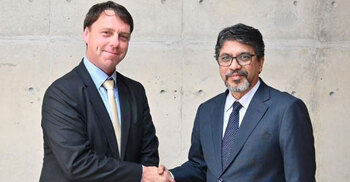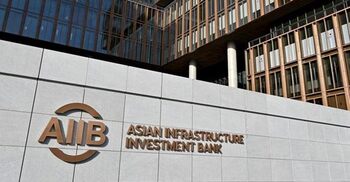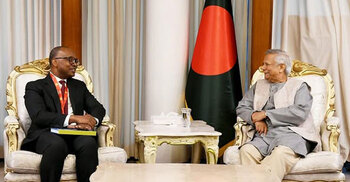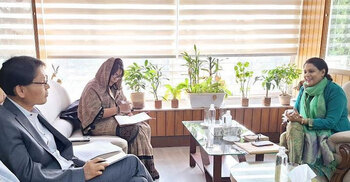Current situation in Bangladesh suitable for investment: EIB VP
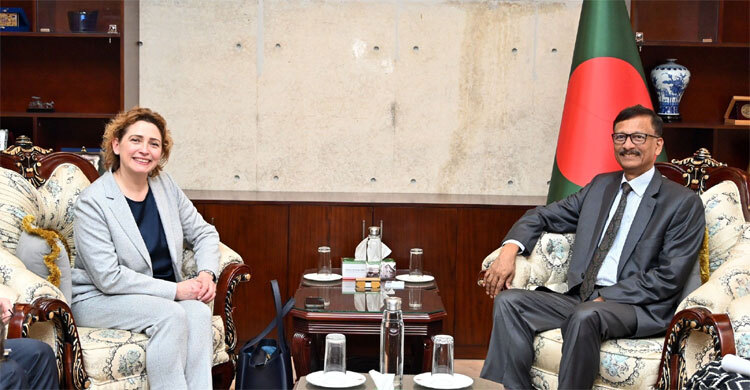
Visiting European Investment Bank, EIB, Vice-President Nicola Beer on Tuesday, January 7, said that her bank is backing the Bangladesh interim government and the country’s current state is suitable for European investment.
“The current situation (in Bangladesh) . . . I see it’s stable for investment, so we go on with what we already decided together (with Dhaka). So, this was the reason why I was speaking about further signatures during this year's time,” she told reporters after holding a meeting with Foreign Adviser Md Touhid Hossain at the Foreign Ministry in Dhaka this afternoon.
Responding to a question regarding the upcoming election, Beer said that it is up to the Bangladeshi “citizens and bodies to decide on the moment of elections”.
The EIB vice-president began her three-day Bangladesh visit today to review the existing partnerships, discuss various issues and explore expanded investment cooperation with the interim government.
Beer said that the EIB is closely aligned with the Bangladesh interim government’s programme of reforms and plans for leading the country to elections soon.
“I think we are quite near when it comes up for the programme of the interim government to reform and lead it to elections, quite soon," she said.
The EIB vice president said that her bank supports this interim government’s efforts and is working with various ministries to identify priority investments, particularly in sectors like water and sanitation.
“We now can also speed up what are the priorities of investments here,” she added.
Beer highlighted the EIB’s ongoing collaboration with Bangladeshi authorities to finalize significant projects within the year and expressed optimism about furthering investment opportunities.
"I only can assure you that the European Union as a whole is standing behind this interim government together with the Bangladeshi people, to serve the Bangladeshi citizens for the future to come," she added.
The EIB vice-president also underlined the importance of energy, water, and sanitation as pivotal sectors for development.
"Energy is a crucial part of our agenda. We have a framework loan, we want to bring it really down now also in the project and this is something we will look further and try to speed up," she added.
Beer also expressed her eagerness to engage with local ministries, economic leaders, and citizen groups to understand their challenges and aspirations.
Responding to a query on specific investment proposals, Beer said that those are still under discussion.
"We reaffirm the support of the European Union and also of its bank as European Investment Bank. And now we'll see the different projects and maybe also new proposals with the other ministries and sectors. So maybe you ask me in two days’ time," she said.
Regarding international relations, Beer emphasized the EIB and European Union's shared goal of strengthening Bangladesh’s regional standing.
Reaffirming the European Union’s unwavering support for the Bangladeshi people, she said that the EU wants to position Bangladesh as a strong nation on equal footing in the region.
EU Ambassador to Bangladesh Michael Miller, among others, accompanied her during the meeting with Adviser Hossain.
Beer, during her stay in Dhaka, is also scheduled to hold meetings with Finance and Planning Adviser Dr Salehuddin Ahmed, Power, Energy and Mineral Resources; Railways Adviser Muhammad Fouzul Kabir Khan, Environment, Forest and Climate Change, Water resources Adviser Syeda Rizwana Hasan, Local Government, Rural Development and Co-operatives Adviser Asif Mahmud Shojib Bhuyain and Bangladesh Bank Governor Ahsan H Mansur.
She will also have a breakfast meeting with the representatives of the KfW, AfD, ADB, IMF, WB, IFC and JICA.
The vice president will have interactions over dinner with the European Union Chamber of Commerce in Bangladesh (EuroCham).
She is likely to visit Ghandharbpur Water Treatment Plant on Thursday before wrapping up her visit.
The EIB, owned by the 27 EU member states, is the world's largest multilateral financial institution and serves as the European Union's investment bank.
The EIB finances and invests both through equity and debt solutions companies and projects that achieve the policy aims of the European Union through loans, equity and guarantees.
Since its establishment in 1958, the EIB has invested over a trillion euros in projects in Europe and countries worldwide.
Source: BSS


